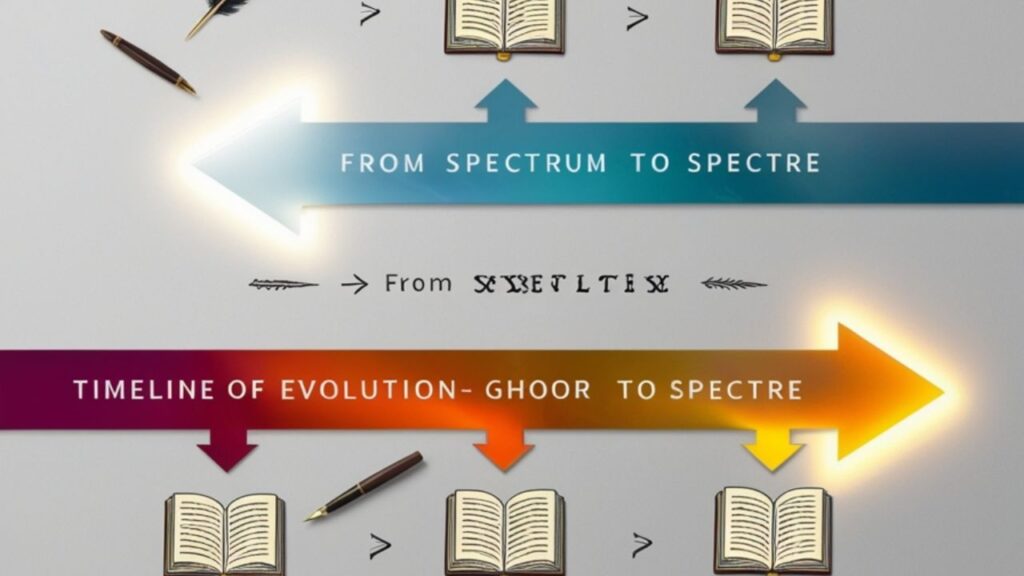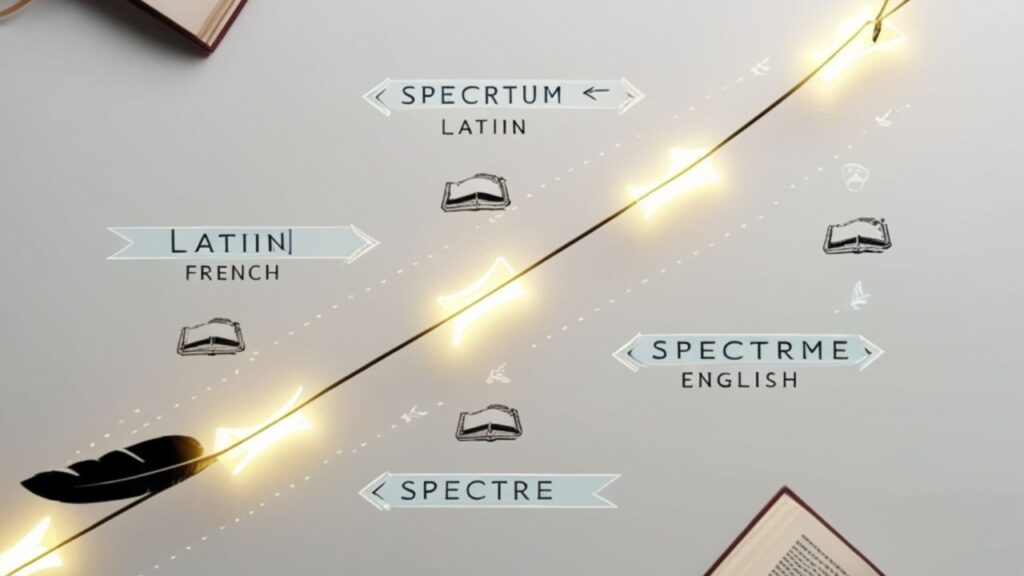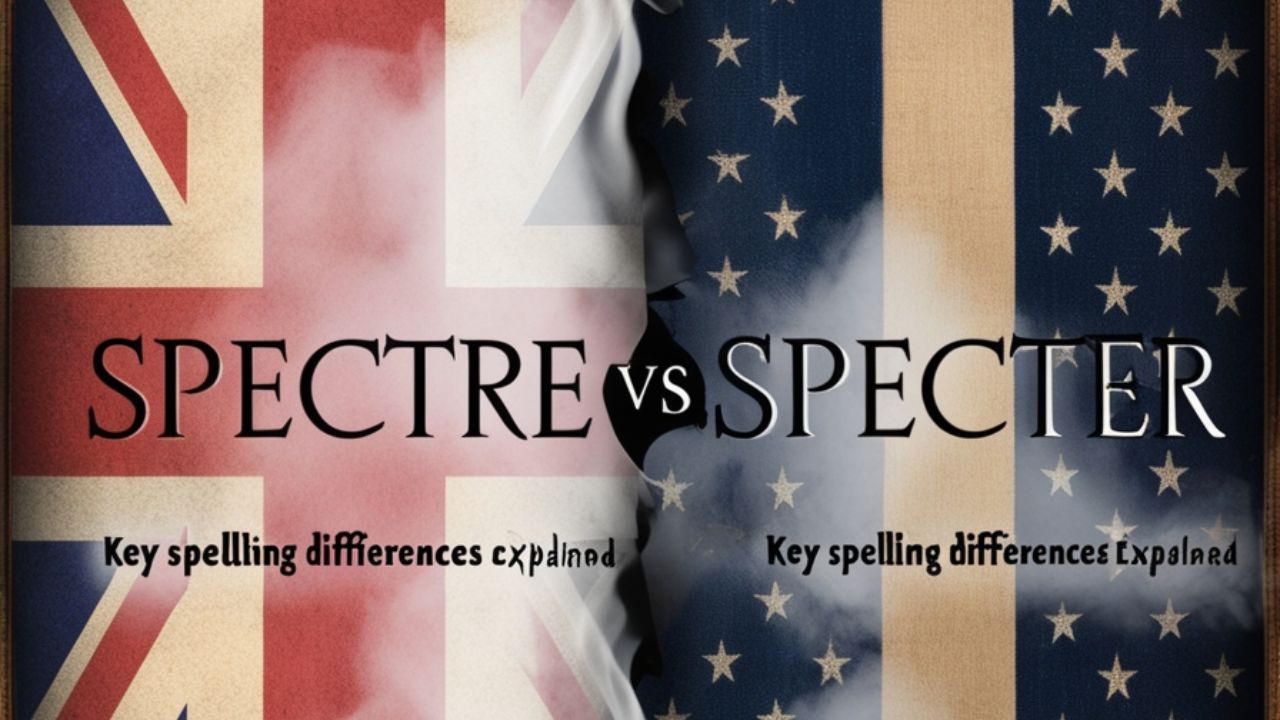The words Spectre and Specter mean the same thing—a ghost or something scary—but people use them differently in different places. In Britain and countries like India or Australia, writers use Spectre. In America, the spelling Specter is more common and modern.
Both spellings come from an old Latin word meaning “appearance.” Over time, the spellings changed as English spread across the world. British people kept the older French-style spelling, while Americans made it simpler. That’s why both words still appear today.
Writers choose one spelling depending on who they’re writing for. A British story about haunted castles might use Spectre, while an American news article might use Specter to sound familiar to readers. Both versions are correct, just part of English’s colorful history.
Spectre vs. Specter: At a Glance
| Word | Region | Meaning | Common Usage |
| Specter | United States | Ghost; looming threat | American literature, politics, media |
| Spectre | UK, Commonwealth | Same meaning | British literature, global cinema, classic texts |
Etymology and Historical Roots of “Specter” and “Spectre”
The word traces back to Latin – specifically, the term spectrum, meaning “appearance” or “image.” This morphed through Old French as spectre before arriving in Middle English around the 1600s.
Timeline of Evolution
The word Spectre began long ago in ancient Latin as “spectrum,” meaning an image or sight. Later, it moved into French and became “spectre.” When English grew from these older languages, people started using this new ghostly word in stories.
As time went on, spelling changed with regions. In Britain, writers kept Spectre because it looked classic and formal. In America, people wrote Specter to make it easier to read and say. Both forms stayed part of English history.
- Latin Origin: The word started as spectrum in Latin, meaning an image or appearance.
- Old French Stage: It evolved into spectre in Old French, keeping its ghostly sense.
- Middle English Period: English borrowed the term, adjusting pronunciation and form.
- American Simplification: Americans later shortened it to Specter for easier spelling.
- Modern English Usage: Today, both Spectre and Specter remain correct, divided by region.
The British vs. American English Divide
The difference between Spectre and Specter shows how English changed across countries. In Britain, people kept the older spelling influenced by French. In America, writers made the word shorter and easier to say. Both forms still mean the same thing.
Over time, the Spectre spelling became a mark of traditional British writing, while Specter reflected American innovation. This split didn’t make one better than the other. It only showed how language grows and adapts in different parts of the world.
Why American English Uses “Specter”
- Simplified Spelling: American writers preferred Specter because it looked cleaner and easier to spell.
- Noah Webster’s Reform: The famous lexicographer promoted simpler words to create a unique American style.
- Phonetic Clarity: Specter matches how the word sounds, making reading and teaching easier.
- Cultural Identity: The new spelling helped separate American English from British influence.
- Modern Consistency: Dictionaries and media in the U.S. continue using Specter to keep writing uniform.
Why British English Retains “Spectre”
Writers in Britain kept Spectre because it connects to their long literary history. It sounds elegant and fits the traditional style of English influenced by French. Many old books and poems use this form, so it feels classic and respected.
People in the United Kingdom still prefer Spectre since it carries a sense of heritage. Teachers, editors, and publishers value the spelling for its cultural roots. It keeps the charm of old English writing alive in schools and media today.
| British English | American English |
| theatre | theater |
| centre | center |
| litre | liter |
| spectre | specter |
Spectre in British English: Literary and Journalistic Usage

In the UK, “spectre” remains the dominant form across literature, journalism, and academia.
British Literary Examples
- Charles Dickens: In A Christmas Carol, Dickens described ghostly Spectres haunting Ebenezer Scrooge’s nights.
- Mary Shelley: Frankenstein used the word Spectre to express fear, guilt, and death’s shadow.
- William Shakespeare: In Hamlet, the prince spoke of his father’s Spectre, setting a mysterious tone.
- Emily Brontë: Wuthering Heights hinted at haunting Spectres wandering the moors.
- T.S. Eliot: His poetry referred to Spectres as symbols of memory, loss, and fading hope.
See also Spoilt vs Spoiled: What’s the Right Word to Use?
British Media Headlines
- The Guardian: “The Spectre of Inflation Looms Over the Economy” highlighted fears of rising prices across the UK.
- The Independent: “Spectres of Empire Haunt Brexit Britain” linked history with modern politics.
- BBC News: “The Spectre of Recession Returns” discussed economic slowdown concerns.
- The Times: “A Spectre of Unrest Shadows the Streets” covered growing social tensions.
- Financial Times: “Spectre of Debt Threatens Global Stability” examined worldwide financial risks.
Specter in American English: Usage in Modern Writing
Across the Atlantic, “specter” is the preferred form in all writing contexts.
American Literature and Media
- Edgar Allan Poe: His gothic tales used Specter to describe chilling visions and eerie spirits.
- Stephen King: Modern horror novels often feature a haunting Specter symbolizing fear and guilt.
- The New York Times: Articles mention “the Specter of recession” to discuss economic worries.
- CNN: Reports speak of the “Specter of political division” in national debates.
- Time Magazine: Features headlines like “The Specter of Climate Change,” showing future global threats.
Examples from U.S. News Media
- The New York Times: “The Specter of AI Regulation Grows Stronger” explored rising concerns about technology laws.
- CNN: “The Specter of Political Violence Haunts the Nation” focused on social unrest in America.
- Washington Post: “The Specter of Recession Shadows Wall Street” analyzed financial market fears.
- Los Angeles Times: “A Specter of Drought Threatens the West” reported on environmental challenges.
- Bloomberg: “The Specter of Inflation Returns to the U.S. Economy” discussed growing economic pressure.
Cultural and Symbolic Impact in Media & Pop Culture
James Bond and “SPECTRE”
- Origin: SPECTRE stands for Special Executive for Counter-intelligence, Terrorism, Revenge, and Extortion, a global criminal group in the James Bond series.
- Creator: Ian Fleming introduced SPECTRE in his 1961 novel Thunderball as Bond’s powerful enemy.
- Film Appearance: The organization reappeared in the 2015 movie Spectre, starring Daniel Craig as 007.
- Symbolism: The name SPECTRE reflects mystery, secrecy, and the haunting presence of evil.
- Cultural Impact: The group became one of the most iconic villains in spy fiction, shaping modern spy stories worldwide.
Other Cultural References
- DC Comics: Features The Spectre, a powerful spirit of vengeance who punishes evil and brings justice.
- Marvel Comics: Uses characters named Specter in ghost-themed storylines that explore revenge and redemption.
- Movies: Films like Poltergeist and The Sixth Sense capture the same eerie idea of unseen Spectres.
- Video Games: Titles such as Mass Effect and Destiny use the term Spectre for elite or mysterious agents.
- Music & Art: Bands and artists often use Spectre or Specter in names or lyrics to evoke mystery and emotion.
Global Usage of Spectre and Specter in English Variants
The split in spelling isn’t just UK vs. US – other English-speaking countries vary as well.
Quick Regional Guide
| Country | Preferred Spelling | Notes |
| United States | Specter | Standardized via dictionaries and style guides |
| United Kingdom | Spectre | Official and traditional spelling |
| Canada | Spectre (mostly) | British spellings still dominate |
| Australia | Spectre | British influence remains strong |
| India | Spectre | Follows British educational system |
| South Africa | Spectre | UK alignment |
Choosing the Right Spelling: Guidance for Writers and Editors
Style Guide Recommendations
| Style Guide | Recommended Spelling | Region |
| AP (Associated Press) | Specter | US Media |
| Chicago Manual of Style | Specter | US Academic/Books |
| Oxford Style Manual | Spectre | UK/International |
| Australian Style Manual | Spectre | Australia |
Professional Writing Best Practices
- Stay Consistent: Use either Spectre or Specter throughout your writing to maintain clarity and professionalism.
- Know Your Audience: Choose the spelling that matches your readers’ region—British or American English.
- Follow Style Guides: Refer to trusted manuals like AP, Oxford, or Chicago for correct usage.
- Check Formatting: Ensure spelling, punctuation, and tone stay uniform across all sections of your document.
- Respect Context: When quoting others, keep their original spelling to show accuracy and authenticity.
Mnemonic Devices to Remember the Difference

- Specter – ER for USA: Think of “ER” as in “emergency room,” something common in America, linking it to U.S. spelling.
- Spectre – RE for Royal English: The “RE” ending reminds you of “Royal,” connecting it to British tradition.
- Easy Trick: “E before R” stands for Easier Reading—that’s how Americans simplified spelling.
- Memory Link: Imagine a British crown beside Spectre and a U.S. flag beside Specter to visualize the regions.
- Sound Clue: Both sound the same, but “RE” looks more classic, helping you remember it’s British.
See also “Introduction To vs Introduction Of: Key Differences”
Cheat Sheet: Spelling Reminders
| Spelling | Memory Tip |
| Specter | “ER” is in Americera |
| Spectre | “RE” is in Royal English (UK spelling) |
Examples in Context
Here are sentence examples showing both spellings in proper usage:
Using Specter (American)
- Example 1: “The Specter of unemployment hung over the struggling city.”
- Example 2: “A cold Specter drifted through the dark hallway at midnight.”
- Example 3: “Politicians warned about the Specter of economic collapse.”
- Example 4: “The novel describes the Specter of fear haunting every character.”
- Example 5: “He faced the Specter of failure but kept moving forward with courage.”
Using Spectre (British)
Final Thoughts
Both Spectre and Specter share the same meaning but show how English changes with place and time. Writers use one or the other depending on where they live and who reads their work. Each version keeps English rich and diverse.
The British spelling Spectre reminds people of history and art, while the American form Specter fits modern writing styles. Knowing both helps learners understand language differences and write with care, confidence, and respect for every tradition.
FAQs
What’s the difference between spectre and specter?
Both mean “ghost” or “phantom.” “Spectre” is British English, while “specter” is the American spelling.
What does specter mean?
“Specter” means a ghost, spirit, or something that haunts or threatens, like fear or danger.
How do Americans spell Spectre?
Americans spell it “specter,” following American English conventions.
Is it specter or Spectre UK?
In the UK, the correct spelling is “spectre,” the standard British English form.

Join Bibcia on a journey to master English grammar. Discover easy lessons, writing tips, and practical examples designed to make learning grammar simple and effective.










